Coins of Nepal - catalog with values
Kingdom of Nepal (1768-2008)
Mohar=34 paisa; Paisa=4 dumb (before 1932)
Pratap Singh Shah (1775-1777)
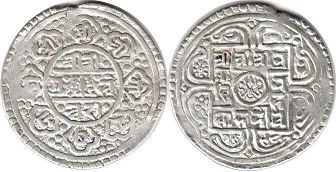
1 mohar 1776
silver
Coin value ~ 15-20 USD
Prithvi Bir Bikram Shah (1881-1911)
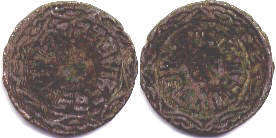
1 paisa 189 (?)
copper
Coin value ~ 5-8 USD
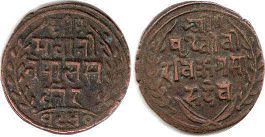
1 paisa 1890
copper
Coin value ~ 5-8 USD
Rupee=2 mohar; Mohar=50 paisa; Paisa=4 dam (1903-1931)
Tribhuvan Bir Bikram Shah (first reign - 1911-1950) old coinage (1911-1931)
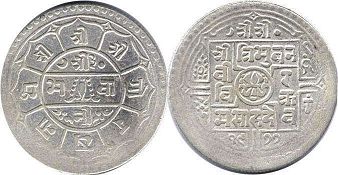
2 mohar 1920
silver
Coin value ~ 30-35 USD
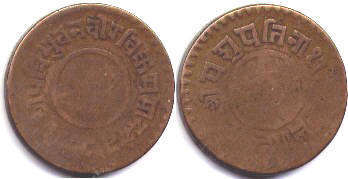
5 paisa 1928
copper
Coin value ~ 5-7 USD
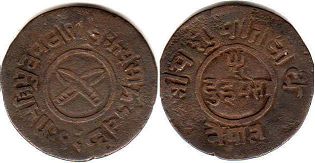
2 paisa 1929
copper
Coin value ~ 5-7 USD
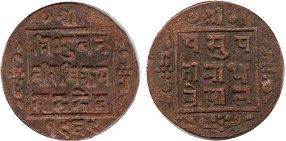
1 paisa 1912
copper
Coin value ~ 8-10 USD
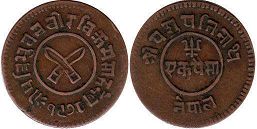
1 paisa 1921
copper
Coin value ~ 5-8 USD
Reform 1932
Rupee=100 paisa (1932-2008)
Tribhuvan Bir Bikram Shah (1911-1950 and 1951-1955) decimal coinage (1932-1955)
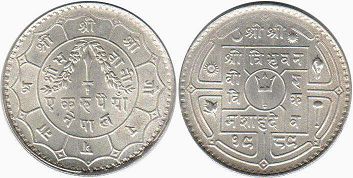
1 rupee 1932
silver
Coin value ~ 30-35 USD
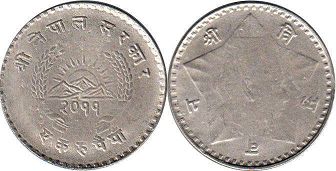
1 rupee 1954
copper-nickel
Coin value ~ 3-5 USD
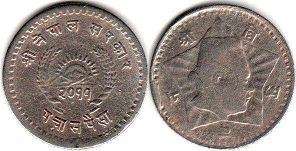
50 paisa 1954
copper-nickel
Coin value ~ 3-5 USD
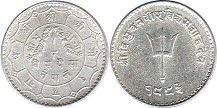
20 paisa 1936
silver
Coin value ~ 10-15 USD
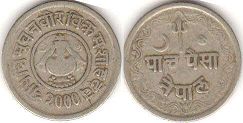
5 paisa 1943
copper-nickel-zinc
Coin value ~ 5-7 USD
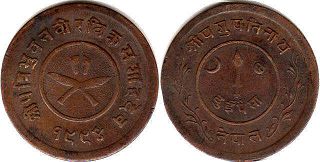
2 paisa 1936
copper
2 mm. wide rim
Coin value ~ 5-7 USD
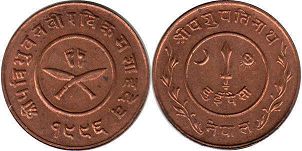
2 paisa 1939
copper
1 mm. or less rim
Coin value ~ 5-7 USD
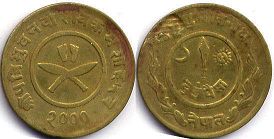
2 paisa 1943
brass
Coin value ~ 5-7 USD
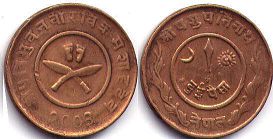
2 paisa 1946
copper
Coin value ~ 3-4 USD
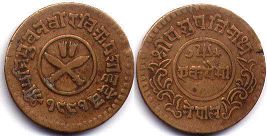
1 paisa 1934
copper
Coin value ~ 4-6 USD
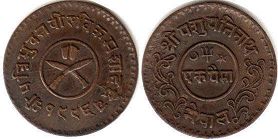
1 paisa 1939
copper
Coin value ~ 10-15 USD
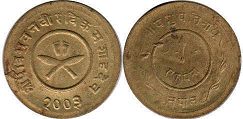
1 paisa 1946
brass
Coin value ~ 3-4 USD
Anonymous coinage (1953-1957)
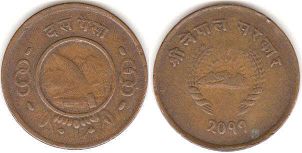
10 paisa 1954
bronze
Coin value ~ 6-8 USD
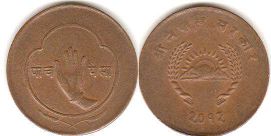
5 paisa 1955
bronze
Coin value ~ 5-7 USD
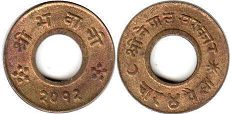
4 paisa 1955
brass
Coin value ~ 4-5 USD
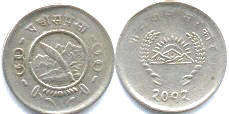
2 paisa 1955
brass
Coin value ~ 6-10 USD
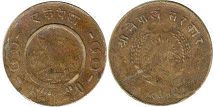
1 paisa 1955
brass
Coin value ~ 5-8 USD
Mahendra Bir Bikram (1955-1972)
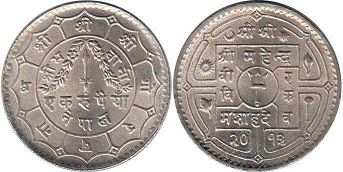
1 rupee 1956
copper-nickel
Coin value ~ 4-6 USD
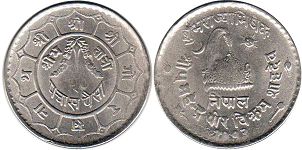
50 paisa 1956
copper-nickel
Mahendra Coronation
Coin value ~ 8-10 USD
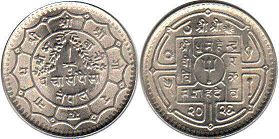
50 paisa 1969
copper-nickel
Coin value ~ 2-3 USD
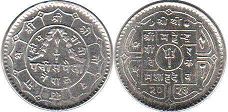
25 paisa 1966
copper-nickel
Coin value ~ 2-3 USD
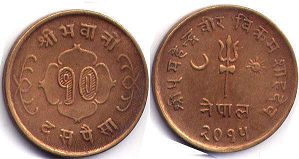
10 paisa 1957
bronze
Coin value ~ 3-4 USD
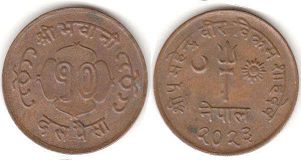
10 paisa 1966
bronze
Coin value ~ 3-4 USD
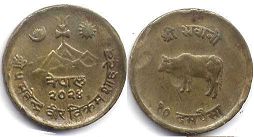
10 paisa 1967
brass
Coin value ~ US$1
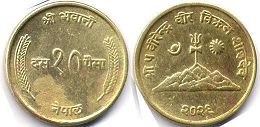
10 paisa 1969 (1967-1969)
brass
circulation coinage
10
2026 / Trident with sun and moon flanking above hills
Coin value ~ 1-2 USD
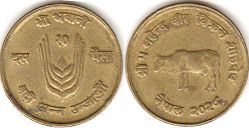
10 paisa 1971
brass
FAO
Coin value ~ US$1
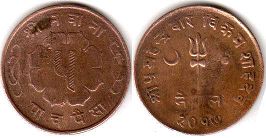
5 paisa 1960
bronze
Coin value ~ 2-3 USD
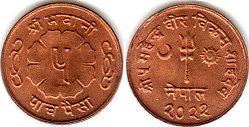
5 paisa 1965
bronze
Coin value ~ 2-3 USD
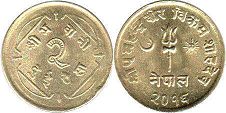
2 paisa 1959
brass
Coin value ~ 2-3 USD
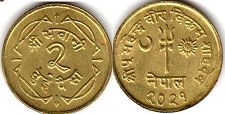
2 paisa 1964
brass
Coin value ~ 2-3 USD
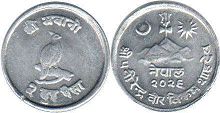
2 paisa 1969
aluminium
Coin value ~ US$1
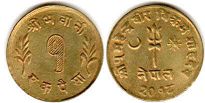
1 paisa 1961
brass
Coin value ~ 3-4 USD
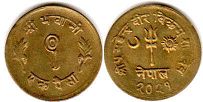
1 paisa 1964
brass
Coin value ~ 1-2 USD
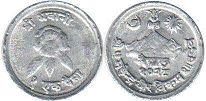
1 paisa 1971
aluminium
1 / Rhododendron
2028 / Trident with sun and moon flanking above hills
Coin value < US$1
Birendra Bir Bikram (1971-2001)
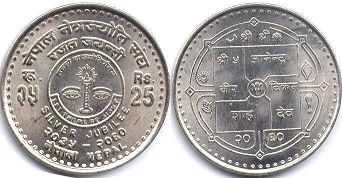
25 rupee 1998
copper-nickel
commemorative coin
25th Anniversary of the First Eye Hospital in Nepal
Rs.25 / SILVER JUBILEE / 2030-2055 / NEPAL / Stylized face design
2055 / Trident
Coin value ~ 7-10 USD
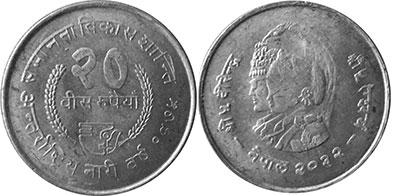
20 rupee 1975
silver
commemorative coin
International Women’s Year
20 / 1975 / grain sprigs
2032 / Busts of King and Queen left
Coin value ~ 10-12 USD
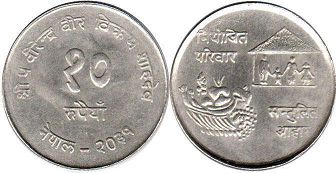
10 rupee 1974
silver
commemorative coin
FAO
10 / 2031
Family scene
Coin value ~ 4-6 USD
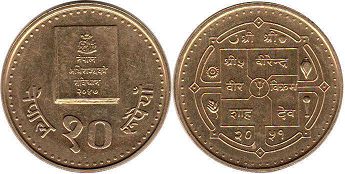
10 rupee 1994
brass plated steel
commemorative coin
Constitution of Nepal
10 / Closet book
2051 / Trident
Coin value ~ 3-5 USD
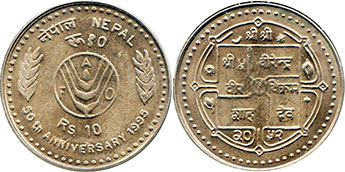
10 rupee 1995
copper-nickel
commemorative coin
50th Anniversary of F.A.O
NEPAL 10 FAO Rs 10 / 50 TH ANNYVERSARY 1995 / Logo, ears
2052 / Trident
Coin value ~ 8-12 USD
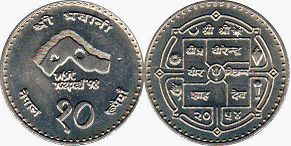
10 rupee 1997
copper-nickel
commemorative coin
Visit Nepal
5 / VISIT NEPAL'98 / Moon and sun flanking mountaintop
2054 / Trident
Coin value ~ 1-2 USD
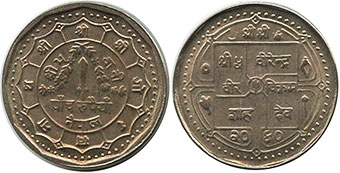
5 rupee 1983 (1982-1983)
copper-nickel
circulation coinage
Dagger flanked by garlands
2040 / Trident
Coin value ~ 8-12 USD
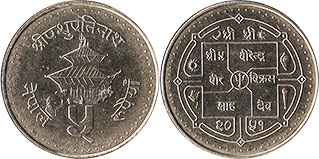
5 rupee 1994
brass plated steel
circulation coinage
5 / Temple
2051 / Trident
Coin value ~ 1-2 USD
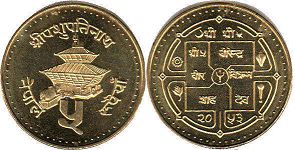
5 rupee 1996
brass
circulation coinage
5 / Temple
2053 / Trident
Coin value ~ 1-2 USD
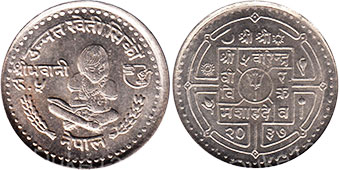
5 rupee 1980
copper-nickel
commemorative coin
Rural Women’s Advancement
5 / Sitting girl with a book
2037 / Trident
Coin value ~ 5-7 USD
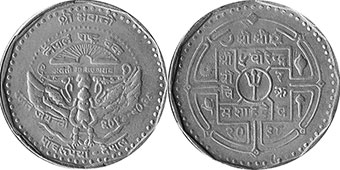
5 rupee 1981
copper-nickel
commemorative coin
National Bank Silver Jubilee
2013-2038 / Winged monkey at center
2038 / Trident
Coin value ~ 8-12 USD
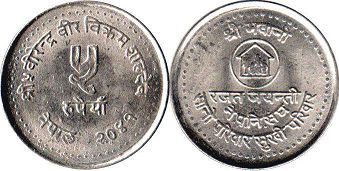
5 rupee 1984
copper-nickel
commemorative coin
Family Planning
5 / 2041
Home with family
Coin value ~ 1-2 USD
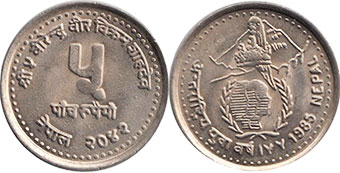
5 rupee 1985
copper-nickel
commemorative coin
International Year of Youth
5 / 2042
IYY 1985 NEPAL / Face of a young man inside a wreath, Crown and mountain above
Coin value ~ 8-12 USD
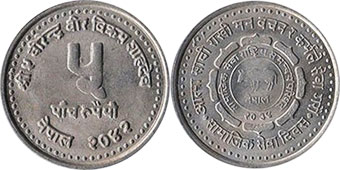
5 rupee 1985
copper-nickel
commemorative coin
Social Services
5 / 2042
2034 / Ox left within small center circle
Coin value ~ 8-12 USD
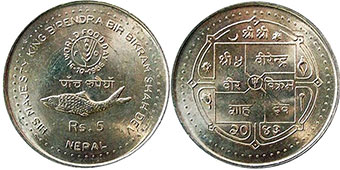
5 rupee 1986
copper-nickel
commemorative coin
World Food Day
Rs.5 NEPAL / HIS MAGESTY KING BIRENDRA BIR BIKRAM SHAH DEV / FAO WORLD FOOD DAY 16-10-1986 / Fish left below logo
2043 / Trident
Coin value ~ 4-6 USD
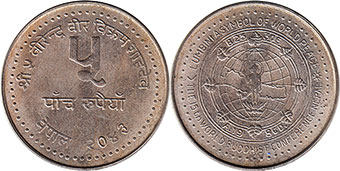
5 rupee 1986
copper-nickel
commemorative coin
15th World Buddhist Conference
5 2043
THE 15TH WORLD BUDDHIST CONFERENCE NEPAL / LUMBINI A SYMBOL OF WORLD PEACE/ B2530E / A.1986 D. / Figure at center of globe within ornamented circle
Coin value ~ 5-8 USD
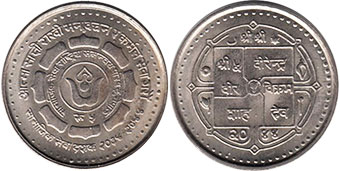
5 rupee 1987 (1987-1988)
copper-nickel
commemorative coin
10th Year of National Social Security Administration
5 / 2034 2044 / Emblem at center
2044 / Trident
Coin value ~ 8-12 USD
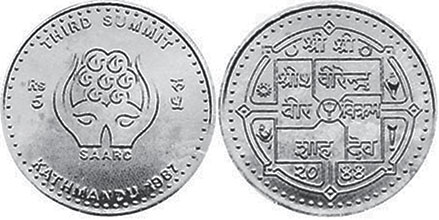
5 rupee 1987
copper-nickel
commemorative coin
3rd SAARC Summit
Rs.5 / THIRD SUMMIT SAARC KATHMANDU 1987 / Summit emblem
2044 / Trident
Coin value ~ ? USD
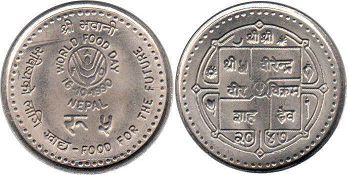
5 rupee 1990
copper-nickel
commemorative coin
World Food Day
WORLD FOOD DAY 16-10-1990 / NEPAL / 5 / FOOD FOR THE FUTURE / Logo
2047 / Trident
Coin value ~ 5-7 USD
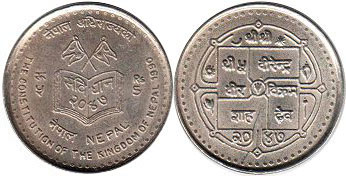
5 rupee 1990
copper-nickel
commemorative coin
New Constitution
Rs5 / 2047 / NEPAL / THE CONSTTUTION OF THE KINGDOM OF NEPAL 1990 / Flags above open book
2047 / Trident
Coin value ~ 3-4 USD
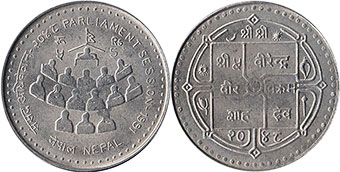
5 rupee 1991
copper-nickel
commemorative coin
Parliament Session
Rs 5 / NEPAL / 2048 PARLIAMENT SESSION 1991 / Symbolic figures of parliaments members
2048 / Trident
Coin value ~ 5-8 USD
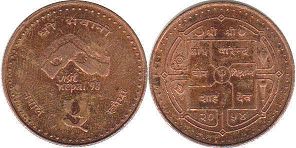
5 rupee 1997
copper
commemorative coin
Visit Nepal
5 / VISIT NEPAL'98 / Moon and sun flanking mountaintop
2054 / Trident
Coin value ~ 1-2 USD
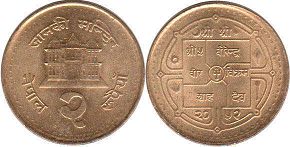
2 rupee 1995 (1994-1995)
brass plated steel
circulation coinage
24.4 mm.
2 / Building
2052 / Trident
Coin value ~ 1-2 USD
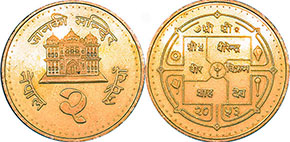
2 rupee 1996 (1996-2000)
brass plated steel
circulation coinage
25 mm.
2 / Building
2053 / Trident
Coin value ~ 1-2 USD
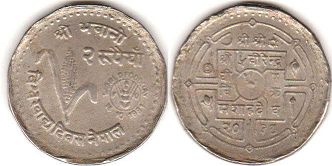
2 rupee 1981
copper-nickel
commemorative coin
World Food Day
2 / Corn ear at left, logo at right
2038 / Trident
Coin value ~ 1-2 USD
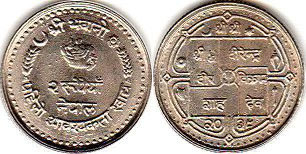
2 rupee 1982
copper-nickel
commemorative coin
FAO
2 / Logo, grain sprigs
2039 / Trident
Coin value ~ 1-2 USD
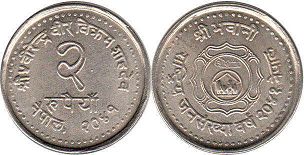
2 rupee 1984
copper-nickel
commemorative coin
Family Planning
2 / 2041
2041 / Home with family
Coin value ~ 1-2 USD
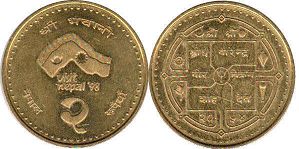
2 rupee 1997 (1996-1997)
brass
commemorative coin
Visit Nepal
2 / VISIT NEPAL'98 / Moon and sun flanking mountaintop
2054 / Trident
Coin value ~ 1-2 USD
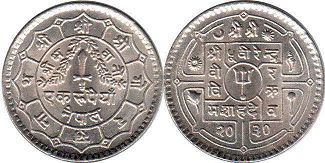
1 rupee 1973 (1971-1974)
copper-nickel
circulation coinage
10.2 g.
Dagger flanked by garlands
2030 / Trident
Coin value ~ 2-3 USD
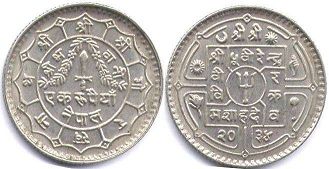
1 rupee 1977 (1976-1979)
copper-nickel
circulation coinage
7.5 g.
Dagger flanked by garlands
2034 / Trident
Coin value ~ 1-2 USD
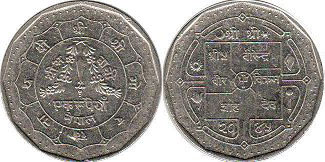
1 rupee 1988 (1988-1992)
stainless steel
circulation coinage
Dagger flanked by garlands
2045 / Trident
Coin value ~ 1-2 USD
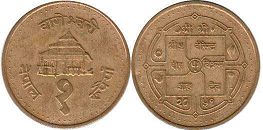
1 rupee 1994 (1994-1995)
brass
circulation coinage
1 / Building
2051 / Trident
Coin value ~ US$1
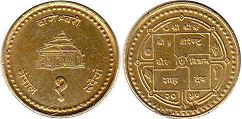
1 rupee 2000 (1995-2000)
brass
circulation coinage
1 / Building
2057 / Trident
Coin value ~ US$1
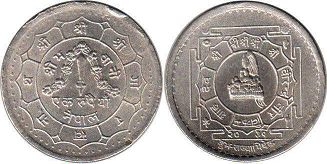
1 rupee 1974
copper-nickel
commemorative coin
Birendra Coronation
Dagger flanked by garlands
2031 / Crown
Coin value ~ 10-12 USD
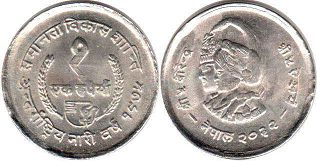
1 rupee 1975
copper-nickel
commemorative coin
International Women's Year
1 / Grain sprigs
2032 / Bust left
Coin value ~ 2-3 USD
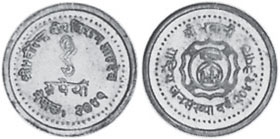
1 rupee 1984
copper-nickel
commemorative coin
Family Planning
1 / 2041
2041 / Home with family
Coin value ~ 10-20 USD
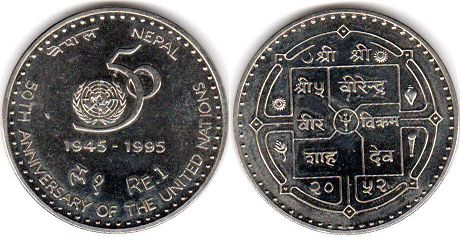
1 rupee 1995
commemorative coin
copper-nickel
50th Anniversary of the UN
50 / 1945-1995 / RE.1 / 50TH ANNIVERSARY OF THE UNITED NATIONS / NEPAL
2052 / Trident
Coin value ~ 7-8 USD
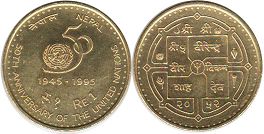
1 rupee 1995
brass plated steel
commemorative coin
50th Anniversary of the UN
50 / 1945-1995 / RE.1 / 50TH ANNIVERSARY OF THE UNITED NATIONS / NEPAL
2052 / Trident
Coin value ~ 1-2 USD
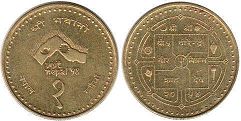
1 rupee 1997
brass
commemorative coin
Visit Nepal
1 / VISIT NEPAL'98 / Moon and sun flanking mountaintop
2054 / Trident
Coin value ~ US$1
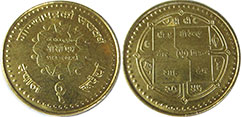
1 rupee 2000
brass
commemorative coin
Centenary of Gorkhapatra - oldest national daily newspaper of Nepal
1 / Emblem
2057 / Trident
Coin value ~ 2-3 USD
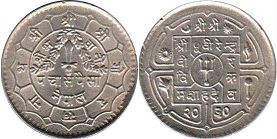
50 paisa 1973 (1971-1982)
copper-nickel
circulation coinage
23.5 mm.
Dagger flanked by garlands
2030 / Trident
Coin value ~ 2-3 USD
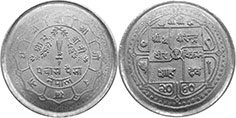
50 paisa 1983 (1982-1984)
copper-nickel
circulation coinage
20 mm.
Dagger flanked by garlands
2040 / Trident
Coin value ~ 8-12 USD
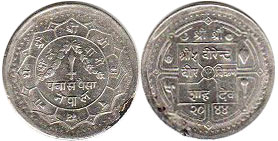
50 paisa 1987 (1987-1990)
copper-nickel
circulation coinage
Dagger flanked by garlands
2044 / Trident
Coin value ~ 2-3 USD
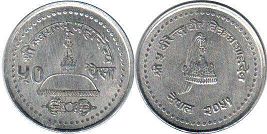
50 paisa 1992 (1992-1998)
aluminium
circulation coinage
50 / Swayambhunath temple
2051 / Crown above crossed flags
Coin value ~ US$1
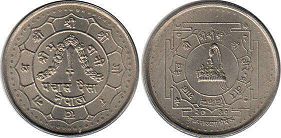
50 paisa 1974
copper-nickel
commemorative coin
Birendra Coronation
Dagger flanked by garlands
2031 / Crown
Coin value ~ 5-6 USD
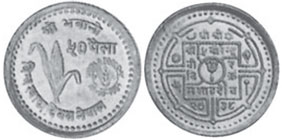
50 paisa 1981
copper-nickel
commemorative coin
World Food Day
50 / Corn ear at left, logo at right
2038 / Trident
Coin value ~ 3-5 USD
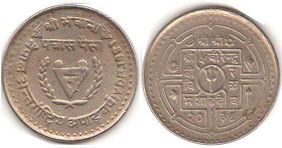
50 paisa 1981
copper-nickel
commemorative coin
International Year of Disabled Persons
Emblem
2038 / Trident
Coin value ~ 5-6 USD
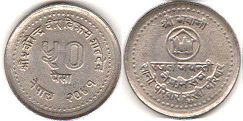
50 paisa 1984
copper-nickel
commemorative coin
Family Planning
50 / 2041
Home with family
Coin value ~ 1-2 USD
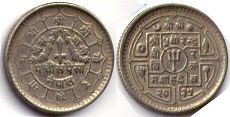
25 paisa 1978 (1971-1982)
copper-nickel
circulation coinage
Dagger flanked by garlands
2035 / Trident
Coin value ~ 1-2 USD
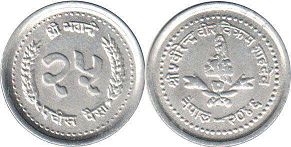
25 paisa 1989 (1982-1993)
aluminium
circulation coinage
25 / Ears of grain
2046 / Crown above crossed flags
Coin value ~ 1-2 USD
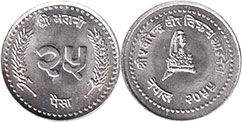
25 paisa 1998 (1994-2000)
aluminium
circulation coinage
25 / Ears of grain
2055 / Crown
Coin value ~ US$1
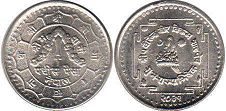
25 paisa 1974
copper-nickel
commemorative coin
Birendra Coronation
Dagger flanked by garlands
2031 / Crown
Coin value ~ 3-4 USD
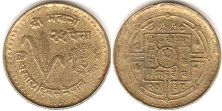
25 paisa 1981
brass
commemorative coin
World Food Day
Corn ear at left, logo at right
2038 / Trident
Coin value ~ 2-3 USD
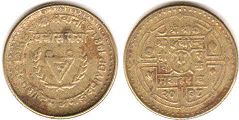
25 paisa 1981
brass
commemorative coin
International Year of Disabled Persons
Emblem
2038 / Trident
Coin value ~ 3-4 USD
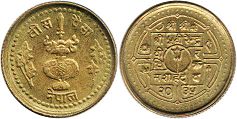
20 paisa 1978
brass
commemorative coin
FAO
Vase, dagger on top
2035 / Trident
Coin value ~ 2-3 USD
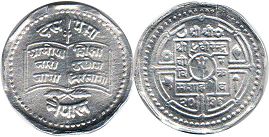
20 paisa 1979
brass
commemorative coin
International Year of the Child
10 / Figure of a child, the rising sun above
2036 / Trident
Coin value ~ 4-5 USD
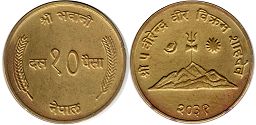
10 paisa 1972 (1972-1974)
brass
circulation coinage
10
2029 / Trident with sun and moon flanking above hills
Coin value ~ 1-2 USD
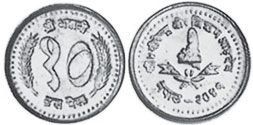
10 paisa 1984 (1982-1985)
aluminium
circulation coinage
Large Ears
10 / Ears of grain
2041 / Crown above crossed flags
Coin value ~ 1-2 USD
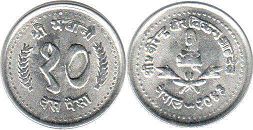
10 paisa 1989 (1984-1993)
aluminium
circulation coinage
Small Ears
10 / Ears of grain
2046 / Crown above crossed flags
Coin value ~ 1-2 USD
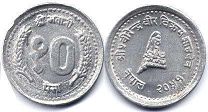
10 paisa 1994 (1994-2001)
aluminium
circulation coinage
10 / Ears of grain
2051 / Crown
Coin value < US$1
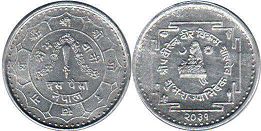
10 paisa 1974
aluminium
commemorative coin
Birendra Coronation
2031 / Dagger flanked by garlands
Crown
Coin value ~ 5-6 USD
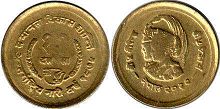
10 paisa 1975
brass
commemorative coin
International Women's Year
10 / Grain sprigs
2032 / Bust left
Coin value ~ US$1
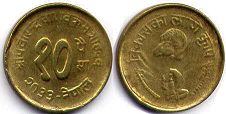
10 paisa 1976
brass
commemorative coin
Agricultural Development
10 / 2033
Sheep’s heleft
Coin value ~ US$1
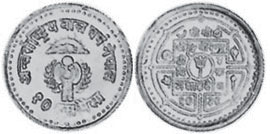
10 paisa 1979
aluminium
commemorative coin
International Year of the Child
10 / Figure of a child, the rising sun above
2036 / Trident
Coin value ~ 6-10 USD

10 paisa 1979
aluminium
commemorative coin
Education for Village Women
Opened book
2036 / Trident
Coin value ~ 2-3 USD
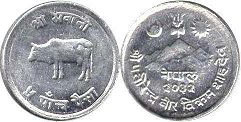
5 paisa 1975 (1971-1982)
aluminium
circulation coinage
5 / Ox left
2032 / Trident with sun and moon flanking above hills
Coin value ~ 1-2 USD
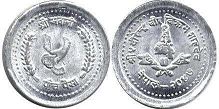
5 paisa 1990 (1982-1990)
aluminium
circulation coinage
5
2047 / Crown above crossed flags
Coin value < US$1
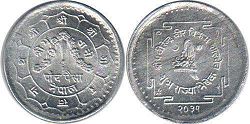
5 paisa 1974
aluminium
commemorative coin
Birendra Coronation
2031 / Dagger flanked by garlands
Crown
Coin value ~ 2-3 USD
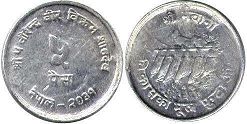
5 paisa 1974
aluminium
commemorative coin
FAO
5 / 2031
Irrigation dam
Coin value < US$1
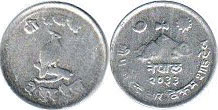
2 paisa 1976 (1971-1978)
aluminium
2 / Himalayan Monal pheasant
2033 / Trident with sun and moon flanking above hills
Coin value ~ US$1
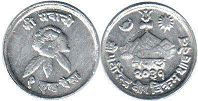
1 paisa 1974 (1971-1979)
aluminium
circulation coinage
1 / Rhododendron
2031 / Trident with sun and moon flanking above hills
Coin value ~ US$1

1 paisa 1974
aluminium
commemorative coin
Birendra Coronation
2031 / Dagger flanked by garlands
Crown
Coin value ~ 4-5 USD
Gyanendra Bir Bikram (2001-2007)
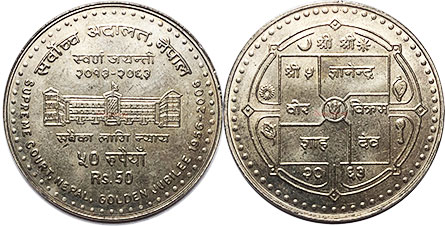
50 rupee 2006
copper-nickel
commemorative coin
50th Anniversary of Supreme Court
2013-2063 / 50 Rs.50 / SUPREME COURT NEPAL, GOLDEN JUBILEE 1956-2006 / Court building
2063 / Trident
Coin value ~ 5-7 USD
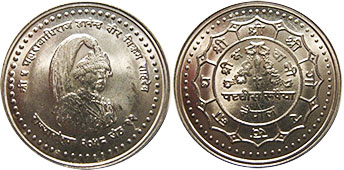
25 rupee 2001
copper-nickel
commemorative coin
Coronation
2060 / King
2060 / Dagger flanked by garlands
Coin value ~ 10-12 USD
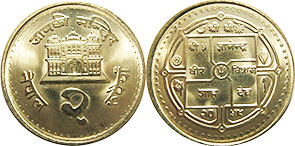
2 rupee 2001 (2001-2003)
brass
circulation coinage
2 / Three domed building
2058 / Trident
Coin value ~ US$1
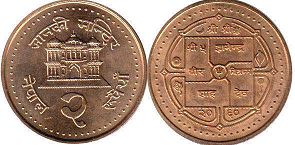
2 rupee 2003
brass plated steel
circulation coinage
2 / Three domed building
2060 / Trident
Coin value < US$1
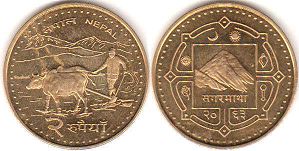
2 rupee 2006
brass plated steel
circulation coinage
2 / NEPAL / Peasant with a buffalo, mountains on the background
2063 / Everest
Coin value < US$1
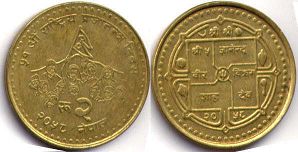
2 rupee 2001
brass
commemorative coin
50 years of Democracy
2 / 2058 / People with flag
2058 / Trident
Coin value ~ 5-10 USD
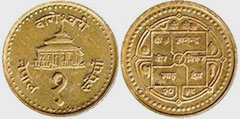
1 rupee 2001
brass
1 / Wagheshwari Temple
2058 / Trident
Coin value ~ 1-2 USD
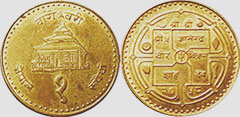
1 rupee 2001
brass plated steel
1 / Wagheshwari Temple
2058 / Trident
Coin value ~ 1-2 USD
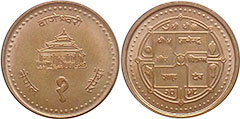
1 rupee 2001 (2001-2003)
brass plated steel
smaller temple
1 / Wagheshwari Temple
2058 / Trident
Coin value < US$1
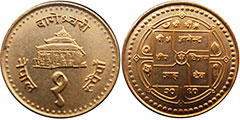
1 rupee 2003 (2002-2003)
brass plated steel
larger digit
1 / Wagheshwari Temple
2060 / Trident
Coin value < US$1
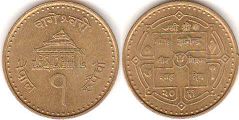
1 rupee 2004
brass plated steel
1 / Wagheshwari Temple
2061 / Trident
Coin value < US$1
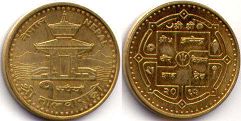
1 rupee 2005
brass plated steel
1 / Sri Talbarahi Temple
2062 / Trident
Coin value < US$1
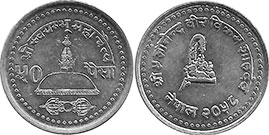
50 paisa 2001 (2001-2002)
aluminium
50 / Swayambhunath temple
2059 / Crown
Coin value ~ US$1
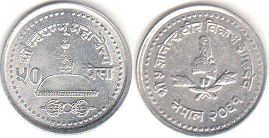
50 paisa 2004 (2003-2004)
aluminium
50 / Swayambhunath temple
2061 / Crown above crossed flags
Coin value < US$1
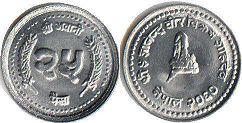
25 paisa 2003 (2001-2003)
aluminium
25 / Ears of grain
2060 / Crown
Coin value < US$1
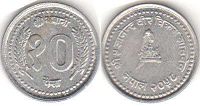
10 paisa 2001
aluminium
10 / Ears of grain
2058 / Crown
Coin value < US$1
Federal Democratic Republic of Nepal (since 2007)
Rupee=100 paisa
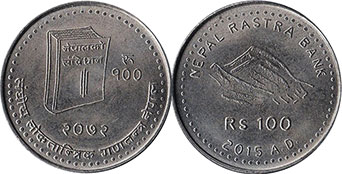
100 rupee 2015
copper-zinc
commemorative coin
New Constitution
100 2092 / Book
RS 100 2015 A.D. / NEPAL RASTRA BANK / Mount
Coin value ~ 8-12 USD
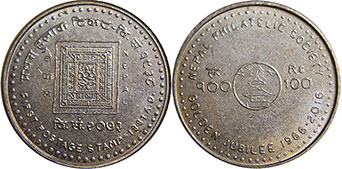
100 rupee 2016
copper-zinc
commemorative coin
50th Anniversary of Nepal Philatelic Society
NEPAL 2093 / FIRST POSTAGE STAMP - 1881 / Stamp
100 RS 100 / NEPAL PHILATELISTIC SOCIETY / GOLDEN JUBILEE 1966-2016 / Pagoda
Coin value ~ 8-12 USD
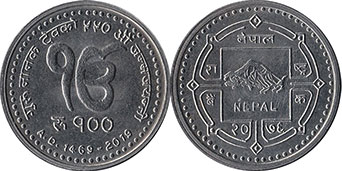
100 rupee 2019
copper-zinc
commemorative coin
550 Years of Guru Nanak (founder of Sikhism)
100 / A.D. 1469-2019
NEPAL 2076 / Mount
Coin value ~ 8-12 USD
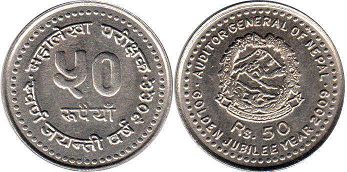
50 rupee 2009
copper-nickel
commemorative coin
Golden Jubilee of Auditor General of Nepal
50 / 2066
Rs.50 / AUDITOR GENERAL OF NEPAL / GOLDEN JUBILEE YEAR 2009 / Emblem
Coin value ~ 15-20 USD
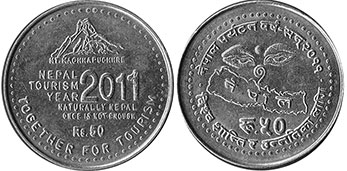
50 rupee 2011
copper-nickel
commemorative coin
Nepal Tourism Year
Rs.50 / MT. MACHHAPUCHHRE / 2011 NEPAL TOURISM YEAR / NATURALLY NEPAL ONCE NOT ENOUGH / TOGETHER FOR TOURISM / Mount
50 / 2011 / Outlines of Nepal, flower
Coin value ~ 8-12 USD
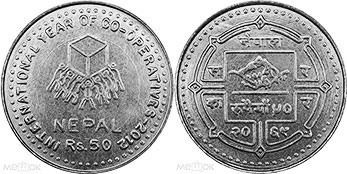
50 rupee 2012
copper-nickel
commemorative coin
International Year of Cooperatives
Rs.50 / NEPAL / IMTERMATIONAL YEAR OF CO-OPERATIVES 2012 / People raise a cube
50 / 2068
Coin value ~ 8-12 USD
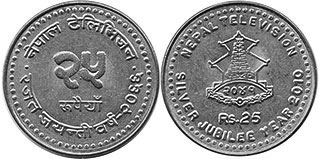
25 rupee 2010
copper-nickel
commemorative coin
50th Anniversary of Nepali Television
25 / 2066
2041 / Rs.25 / NEPAL TELEVISION / SILVER JUBILEE YEAR 2010 / Pagoda
Coin value ~ 8-12 USD
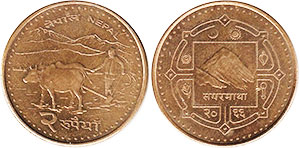
2 rupee 2009
brass plated steel
circulation coinage
Type the same as previous (2006)
2 / NEPAL / Peasant with a buffalo, mountains on the background
2066 / Everest
Coin value < US$1
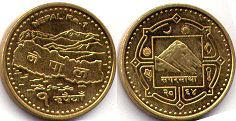
1 rupee 2007 (2007, 2009)
brass plated steel
1 / NEPAL Rs.1 / Outlines of Nepal, mountains on the background
2064 / Everest
Coin value < US$1
Costs of Nepal coins in this catalog approximate and indicated specifically for the coin shown in the picture.
I do not buy or sell coins - this is just a catalog.

